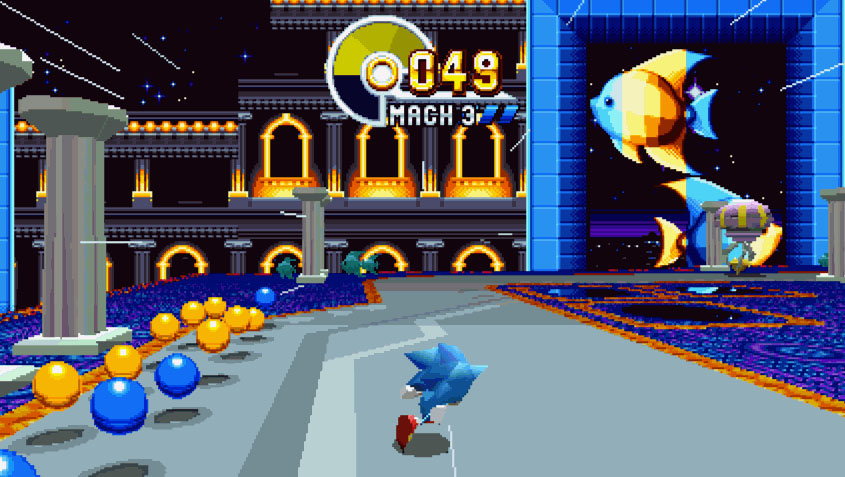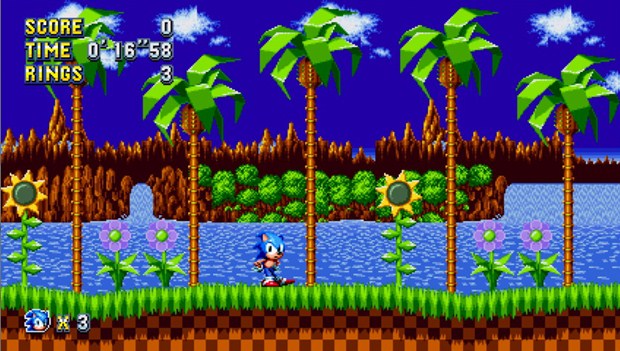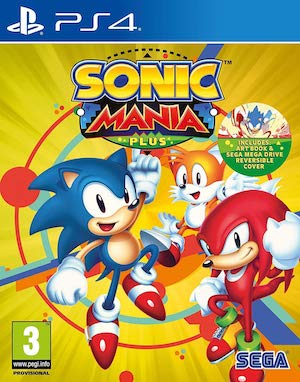
Sonic has had a rough life. After blazing onto the Genesis as Sega’s answer to Mario and churning out a series of classics in the 16-bit era, Sonic fell on hard times. Sega just didn’t seem to understand what to do with the Blue Blur as games transitioned into 3D, and Sonic’s games have since run the gamut from the atrocious (Sonic ’06) to the pretty good (Sonic Generations). But nothing since has come close to the classic status established by the original releases.
After two decades of sustained mediocrity, Sonic went from one of the greatest icons in the industry and a legitimate rival to Mario to a running joke, as fans hoped that maybe, just maybe, the next entry in the series would somehow recapture the magic Sega so effortlessly accessed in the early 1990s. Followers of the series have endured disappointment after disappointment, but now, nearly 23 years since the release of Sonic and Knuckles, the wait is over. Sonic Mania delivers.
By all rights, Sonic Mania shouldn’t exist. It certainly shouldn’t be this good. After all, it’s essentially a fan-made game. Handing an intellectual property over to fans is an almost universally terrible idea, but Christian Whitehead, Sonic Mania’s lead developer, isn’t your average fan. After working on Sonic fangames for a number of years, Whitehead developed the Retro Engine, which allowed past Sonic games to be recreated with new features and things like widescreen support. Using the engine, Whitehead worked with Sega to re-release Sonic, Sonic 2, and Sonic CD, and ultimately Sega entrusted him, Headcanon, and PagodaWest Games to develop Sonic Mania.
"Sonic Mania is the 16-bit era the way you remember it, not the way it was: it looks better, the controls are tighter, and the music is every bit as loud and joyful."
Sonic Mania is the 16-bit era the way you remember it, not the way it was: it looks better, the controls are tighter, and the music is every bit as loud and joyful. But it’s more than a nostalgia trip. New mechanics like the drop dash (which lets you hit the ground rolling at high speed) mix with existing power-ups from older games. In many ways, Sonic Mania feels like the natural follow-up to Sonic and Knuckles. There’s no obnoxious storytelling, no insufferable sidekicks, no pointless extras. Just you, a course, and speed.
There’s no tutorial or set-up, either. You’re dropped off at Green Hill Zone and expected to know what to do. Run, jump, dash, spin: you’ve been here before, and if you haven’t, you’ll figure things out quickly. Things will feel familiar to old-school Sonic players, as many of the levels are rehashed versions of old classic. The rejiggering means that these levels feel fresh, even if you’ve been to the Chemical Plant or Flying Battery Zone a few dozen times, but the new levels are just as creative and lovingly crafted, and long-time players might be a little disappointed to see that only 5 of the game’s 13 zones are original.
What’s most impressive about the zones is the sheer creativity on display. There’s an intense amount of verticality on display in each zone, giving you lots of room to explore and play. Each zone is also peppered with secrets – from one-off low poly stages that have you chasing Chaos emeralds to special stages that you’ll quite literally run into. Even the splits between acts 1 and 2 of a stage are used wisely. These transitions are seamless, but bring new music, visuals, and gameplay mechanics not present in the preceding act, and in many cases, never appearing again in the rest of the game. Sonic Mania isn’t afraid to introduce an idea, run with it, exhaust it, and put it to rest in a single act. It’s a level of detail that’s reminiscent of Nintendo’s best work, and Whitehead and crew put it to good work here.
"The other way Sonic Mania resembles its forbears is difficulty; this game is hard. Sure, you’ll probably breeze through Green Hill Zone and Chemical Plant Zone, but the further you get, the more Sonic Mania lays it on. Levels get crazier, things get weirder, and bosses get harder."
The other way Sonic Mania resembles its forbears is difficulty; this game is hard. Sure, you’ll probably breeze through Green Hill Zone and Chemical Plant Zone, but the further you get, the more Sonic Mania lays it on. Levels get crazier, things get weirder, and bosses get harder. You’ll probably die a few times. This can be particularly frustrating if you run out of lives in Act 2, because you’ll be sent all the way back to Act 1 of the zone. This is compounded by the fact that bosses can sometimes feel unfair. Once you get the hang of the bosses, though, their core loops are pretty simple. Sonic Mania is tough, but it almost never feels unfair. It just isn’t going to hold your hand. Instead, failure serves as an opportunity to pause, assess what happened, and try again.
If there’s any part of Sonic Mania that disappoints, it’s the game’s multiplayer. In co-op, the game screen follows Sonic, which means that whoever’s playing Tails is probably going to spend most of their time trying to catch up or off-screen. The upside is that Tails is invincible and doesn’t lose rings when hit. It’s not a perfect solution, but it does off-set the frustrating of being player 2. To make matters worse, Competitive Mode stretches the screen on each player’s side. Both modes are playable, but it’s a shame that Sonic Mania is let down by things like this when the game itself is so good.
We overuse the phrase “love letter” these days. It’s easy to, with nostalgia commanding a premium. Hollywood pumps out sequels and reboots by the barrel and the triple-A gaming industry focuses on established properties at the expense of seemingly everything else. But that’s what Sonic Mania is. It’s a game by the fans, for the fans, made to save an ailing icon on his 30th birthday. And in that regard, it is an unqualified success. Welcome back, Sonic. We missed you.
This game was reviewed on the PlayStation 4.
Vibrant 2D visuals. Incredible level design. A fantastic soundtrack. Classic Sonic gameplay with some new twists. Story and annoying sidekicks are kept to a minimum. A mix of classic and new levels.
Old school difficulty will turn some off. Not a lot of new levels. Lackluster co-operative and competitive modes.


















